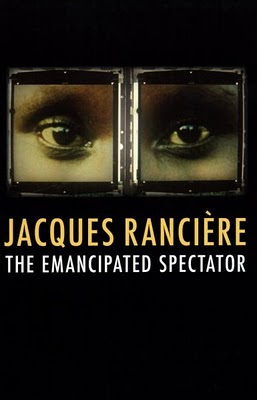The Emancipated Spectator

Ranciere, Jacques. The Emancipated Spectator. Trans. by Gregory Elliot. London: Verso, 2009. I cannot thank Dr. Mary Bryson enough for pointing this book at me. Here, Jacques Ranciere engages on debates about how to understand spectatorship and spectacles. His main point being that there is no such thing as a passive spectator who is a blank receptacle of the flood of images and susceptible to ideological manipulation. Being a spectator is then not something negative on itself, as meaning is produced in an indeterminate way and thus cannot be calculated in advance. In this way, he counters Debord formula that the more a subjects contemplates (his/her own disposession), the less he/she lives. Ranciere proposes to understand viewing as an action in which spectators are also "active interpreters of the spectacle offered to them" (13), "who develop their own translation in order to appropriate the 'story' and make it their own story" (22). Ranciere also takes is...






